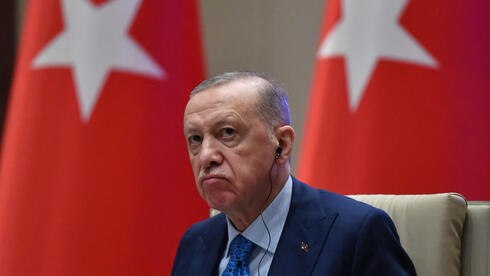In September 2023, New York. Prime Minister Benjamin Netanyahu arrived for the United Nations General Assembly, and on its sidelines, an unusual meeting took shape: Israel’s prime minister and Turkey’s president, Recep Tayyip Erdogan — two leaders who, according to diplomats familiar with both sides, “detest each other.”
Yet reports at the time carried cautious optimism: after years of animosity, were Israel and Turkey drawing closer once again?
7 View gallery
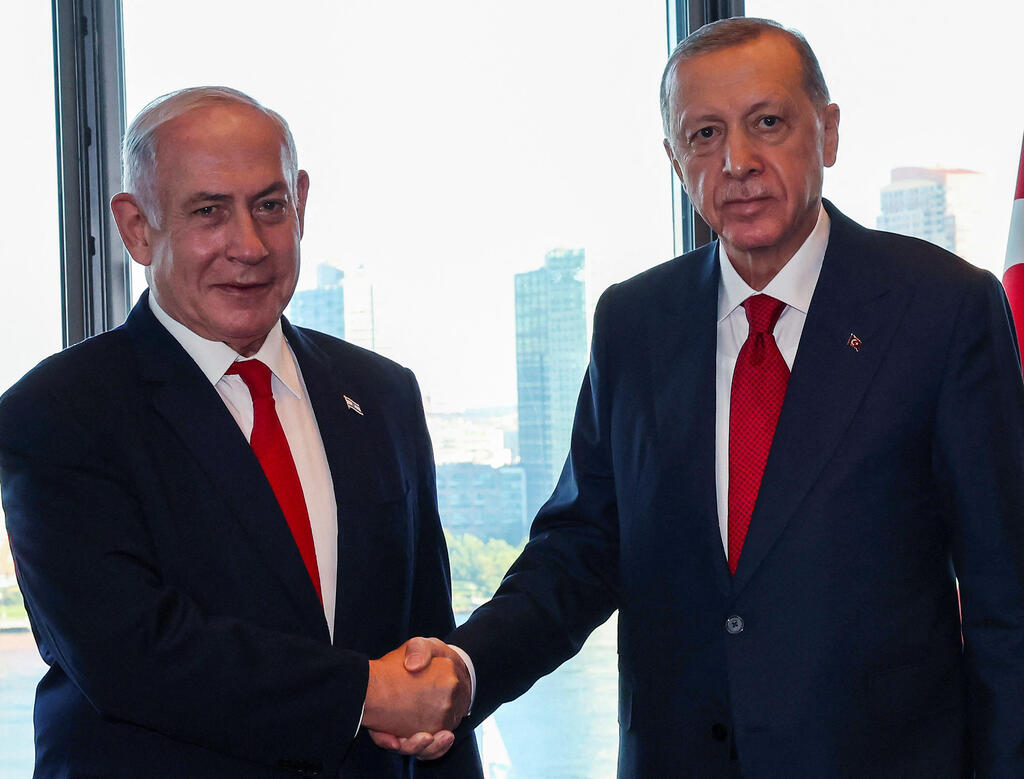

(Photo: Handout/Turkish Presidency Press Office/AFP)
Netanyahu went to the “Turkish House,” an imposing skyscraper complex Erdogan built in Manhattan that serves as Turkey’s consulate and a cultural, economic and tourism hub. Erdogan’s expression, as always, was stern. Analysts explained it as part of his cultivated image — the strict, watchful father of the Turkish nation who rarely smiles, especially not beside Israel’s leader.
Seeking to ease the tension, Netanyahu gestured toward their matching red ties and joked in English: “Our ties are improving — not just our ties.” Erdogan did not laugh. He barely smiled, appearing uneasy.
Media headlines later said the two discussed the Israeli-Palestinian conflict, possible normalization with Saudi Arabia and other regional issues. Erdogan was even expected to make a historic visit to Israel, one that might have symbolized the end of the rupture that began 15 years earlier with the deadly Mavi Marmara flotilla incident.
Eighteen days later came Oct. 7 — the “Black Sabbath” that changed everything.
Erdogan initially reacted with restraint, but soon reverted to vitriol. He called Hamas’s cross-border massacre — in which thousands of terrorists stormed southern Israel, killing civilians and taking hostages — “the bloodiest, most disgusting and cruel attack in history.” Days later, as Israel began its counteroffensive in Gaza, he labeled the military response “a mental illness.”
“The Western tears shed for Israel are an expression of deceit,” Erdogan said.
Two years on, the Turkish president has emerged as one of the architects of the ceasefire that halted the fighting — and one of the war’s biggest beneficiaries. Speaking to members of his ruling party after the truce was signed, Erdogan declared, “Turkey is a country whose horizon is not limited to its territory,” a clear signal that he sees Turkey’s reach extending across the region — including into Gaza.
Supporters at the rally chanted: “Take us to Gaza! Take us to Gaza!”
“First I will go — and you will follow me,” Erdogan replied, drawing loud applause.
For now, Israeli officials say the future remains unclear. It is not yet known whether Turkey will take part in the postwar arrangements in Gaza — or whether that might involve a physical Turkish presence, such as troops or a special task force. In Jerusalem, officials quietly admit that such a scenario would be deeply troubling.
Erdogan, who will soon mark 23 years in power — first as prime minister and since 2014 as president — remains one of the most enigmatic figures in the Muslim world. Among experts, he is viewed as both a pragmatist and an ideologue, a nationalist and an Islamist, a man whose politics are filled with contradictions.
To better understand his motives, Israeli journalists and regional analysts have spent months dissecting his policies: Why has Erdogan thrown himself so fully into Gaza diplomacy? Why does he work to preserve the power of Syria’s post-Assad leadership under President al-Sharaa? And how does this square with his often hostile stance toward Israel?
7 View gallery
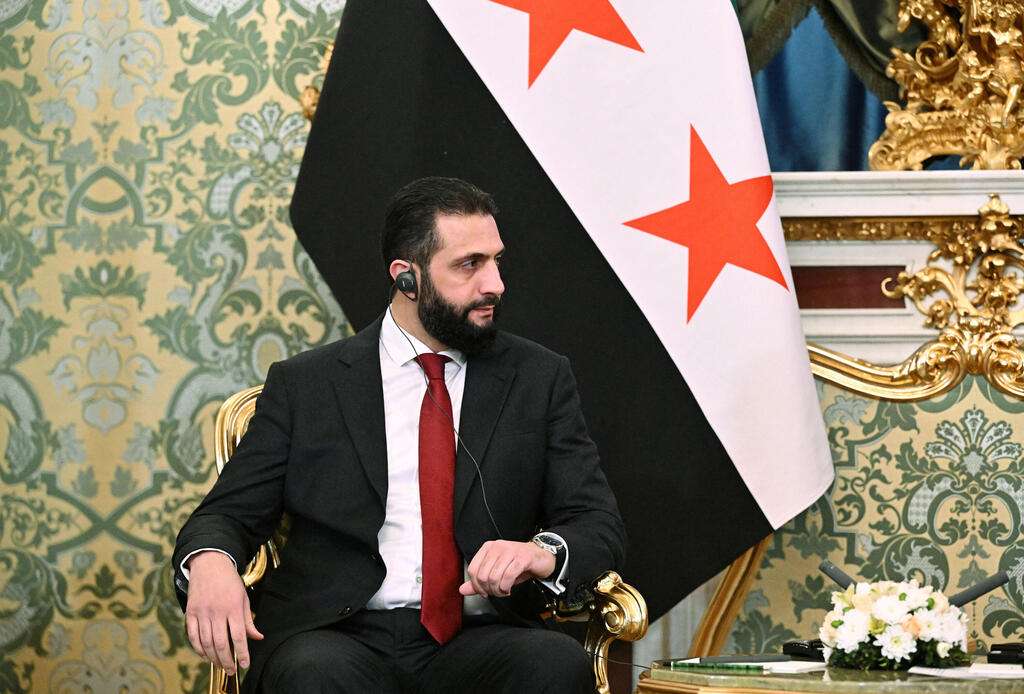

(Photo: Sputnik/Sergey Bobylyov/Pool via REUTERS)
“The answers are many — and sometimes contradictory,” said one Israeli diplomat. “Much like Erdogan himself.”
Those contradictions were visible in October 2025, on the eve of the ceasefire. Erdogan was returning from a summit of the Organization of Turkic States in Azerbaijan when several Turkish parliamentarians, sailing aboard an “aid flotilla” toward Gaza, were detained by authorities. Erdogan said he was tracking the flotilla’s progress “through images we received from our Akinci” — Turkey’s advanced domestically produced combat drone, a centerpiece of his push for military self-reliance.
At the same time, his intelligence chief and confidant, Ibrahim Kalin, was in Sharm el-Sheikh finalizing the terms of the ceasefire. The contradiction was striking: Erdogan simultaneously boasted of monitoring Israel militarily while negotiating its truce.
Weeks earlier, Istanbul hosted 150 Muslim clerics from across the world to discuss aid for Gaza’s civilians. Marwan Abu Ras, a Hamas preacher who spoke at the gathering, urged support for “jihad and weapons for the mujahideen.” His words drew no protest.
In recent years Erdogan himself has set an extreme tone against Israel. “Israel is committing absolute genocide in Gaza,” he declared. “Netanyahu has already surpassed Hitler in the crime of genocide.” In a Ramadan speech he said, “May Allah destroy Zionist Israel.”
“Erdogan has a broad base of religious fundamentalists, and his statements against Israel are meant to satisfy them,” said a Turkish academic specializing in Israel–Turkey relations who asked to remain anonymous. “This way he presents himself as leader of the Islamic nation — and protector of the Palestinians.”
7 View gallery
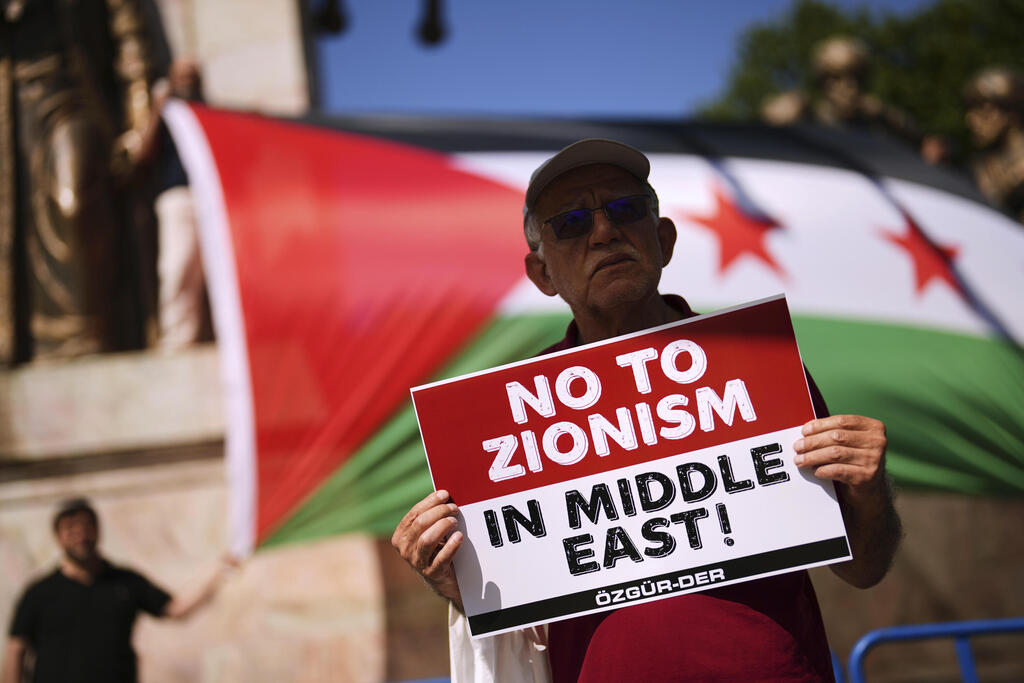

(Photo: AP Photo/Francisco Seco)
Erdogan’s ties to Hamas go back years. “He was the first to congratulate Hamas after it won the 2006 Palestinian elections,” said Dr. Nimrod Goren, president of the Mitvim Institute for Regional Foreign Policies and co-managing director of Diplomeds. “Senior Hamas members later received Turkish passports and operated from Turkey.”
Israel has accused some of those operatives of planning terrorist attacks from Turkish soil. Ankara denies the claims.
Erdogan’s sympathy for Hamas also stems from his self-image as heir to the Ottoman sultans — leader of a resurgent Muslim world guided by Turkish power. His speeches often evoke Ottoman history; Turkish schoolbooks glorify it; television dramas romanticize it.
“Turkey is at a strategic crossroads between Europe, Asia, the Caucasus, the Middle East and Africa,” said the Istanbul researcher. “Erdogan believes Turkey can deliver prosperity, security and peace — under its leadership.”
“The world is bigger than five,” Erdogan often says, referring to the five permanent members of the U.N. Security Council. His point: global leadership should not rest only with those powers — and Turkey deserves a seat at the table.
7 View gallery
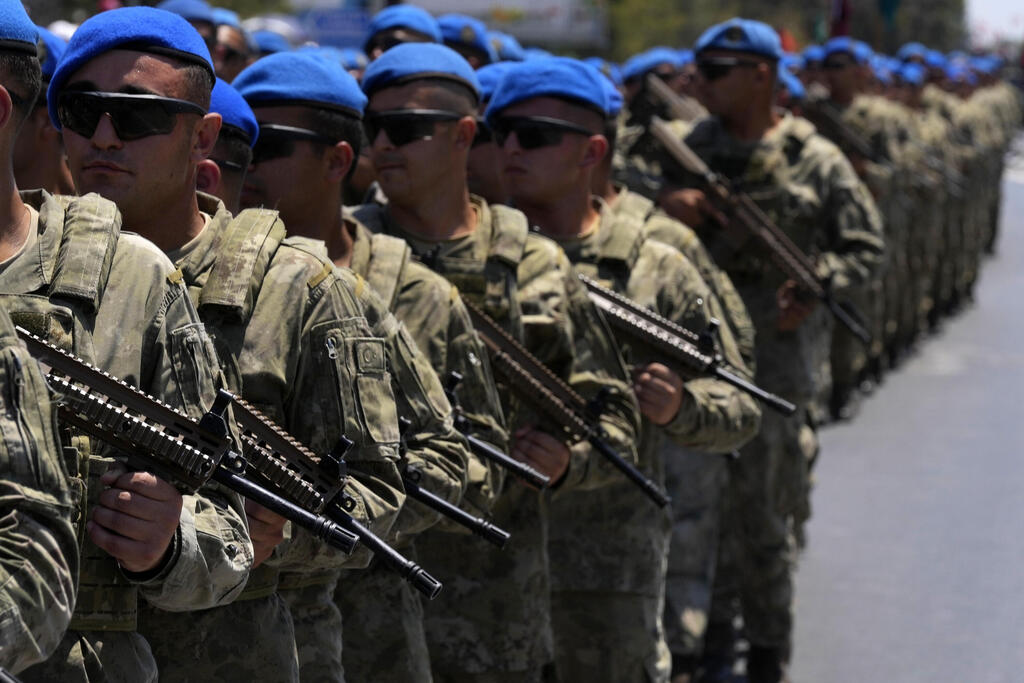

(Photo: AP Photo/Petros Karadjias)
A NATO member with the alliance’s second-largest army, Turkey has built its own drones, is developing a fifth-generation fighter jet and expanding its defense exports. “Turkey is what we call a ‘middle power,’” said Dr. Gallia Lindenstrauss of the Institute for National Security Studies at Tel Aviv University. “It has influence beyond its borders and now plays not just regionally but globally.”
To advance his vision, Erdogan also needed a friend in the White House. Former President Joe Biden was skeptical of his authoritarian drift. But Donald Trump, who prizes transactional diplomacy, embraced Erdogan’s style.
“Erdogan is trying to cash in as many chips as he can while Trump is in office,” said an Israeli diplomat, “because the international legitimacy he enjoys now could vanish overnight.”
7 View gallery
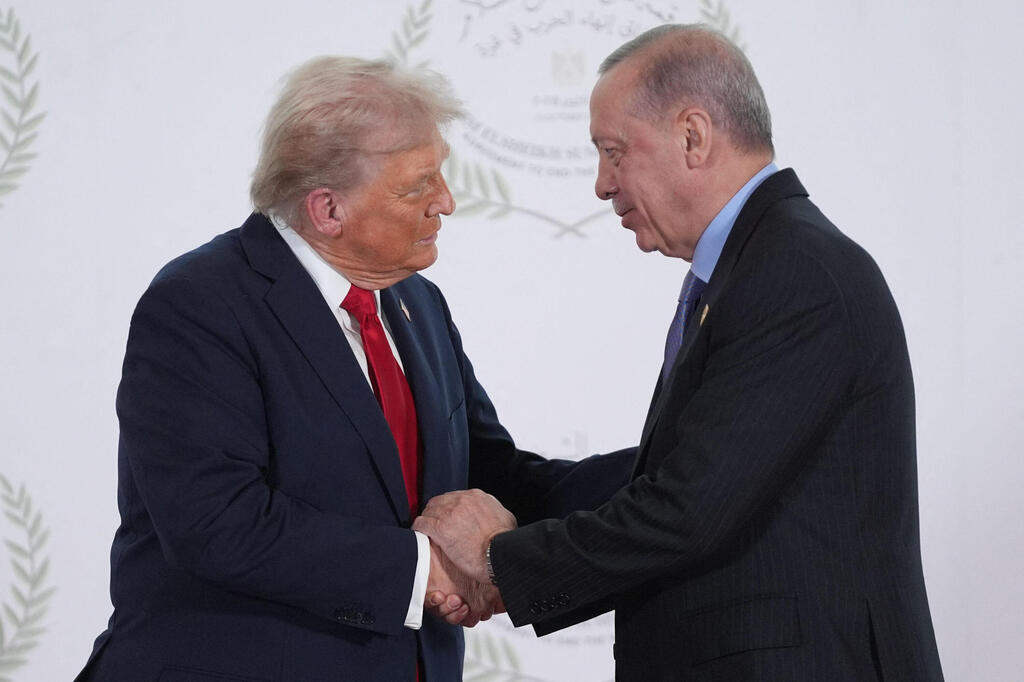

(Photo: Evan Vucci / POOL / AFP)
At the 2025 U.N. General Assembly, Erdogan sat beside Trump during a meeting of Muslim leaders. “Visibility like that positions Turkey as a key player,” said Goren. “It also gives Erdogan domestic political cover at a time of criticism at home.”
The next day Trump and Erdogan shared lunch. “He needs certain things, and we need certain things,” Trump said on camera.
One such “thing,” Israeli officials believe, is relief from U.S. sanctions imposed after Turkey purchased Russia’s S-400 missile defense system. Ankara was expelled from the F-35 fighter program and heavily sanctioned. “Trump may have offered a deal — help on the F-35 in exchange for Turkey’s role in Gaza and less Russian energy,” Lindenstrauss said.
Meanwhile, Erdogan’s domestic troubles deepen. Inflation is high, unemployment widespread, the currency weak and millions of refugees strain resources. “He uses his great-power vision to deflect from internal problems,” an Israeli intelligence official said. “Every photo with Trump or Putin becomes proof of success.”
For Israel, Erdogan’s ambitions are not confined to Gaza. One of Jerusalem’s greatest concerns lies to the north, across the Syrian border, where Turkish troops already operate.
Erdogan views Kurdish forces there — long aligned with the United States — as an existential threat. But after the fall of the Assad regime last year, he also began cultivating Syria’s new ruler, al-Shara.
“Turkey now wants a strong, centralized Syrian government loyal to it,” said Lindenstrauss. “That gives it strategic depth — but it deeply worries Israel, which values its freedom to operate in Syrian airspace.”
Israeli officials fear Turkey could press Damascus to allow Hamas activity on Syrian soil.
“The number of meetings between Turkey’s and Syria’s foreign ministers has been enormous,” said Goren. “Turkey sees opportunity: trade routes through Syria, leverage over Kurds and Cypriots, and a political foothold across the region.”
7 View gallery
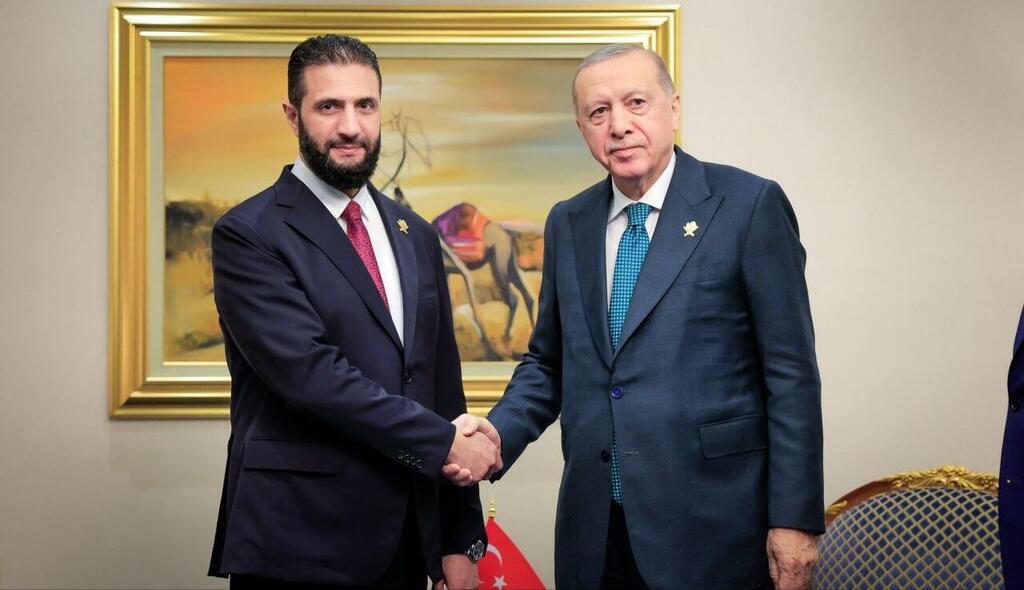

Israel, he said, preferred a weaker, fragmented Syria — one lacking a powerful military.
Tensions escalated when Erdogan claimed Israel planned to invade Turkey, even raising the issue in parliament. Israeli strikes in Iran and Qatar reinforced Ankara’s fears, prompting it to accelerate missile production and expand its air force.
Israel, in turn, reportedly sold air defense systems and older Merkava Mark 3 tanks to Cyprus — moves that further alarmed Ankara. After an Israeli strike on Syria’s T-4 air base, which Turkey viewed as provocative, the crisis peaked. In August, Turkey severed economic ties with Israel entirely.
Still, both sides soon stepped back. Turkey’s main focus remained northern Syria, while Israel concentrated on its southern border. Azerbaijan, friendly with both, helped establish a “hotline” in Baku to prevent misunderstandings and accidental clashes.
According to officials familiar with the talks, Israeli envoys Ron Dermer and Tzachi Hanegbi met their Turkish counterparts there directly — without Azerbaijani mediation. The meetings, they said, were “cordial.”
“There is an arms race, but there are also restraining factors,” Lindenstrauss noted. “Turkey’s NATO membership makes a direct Israel-Turkey war almost unimaginable. And a prolonged ceasefire in Gaza could improve trade and ease tensions.”
For now, Israeli intelligence assesses that a direct confrontation with Turkey is unlikely. Still, Jerusalem is uneasy that countries involved in the ceasefire — including Turkey and Qatar — support or tolerate organizations designated by Israel as terrorist groups.
“If Turkey deploys personnel in Gaza and rockets are fired from nearby, will Israel risk striking Turkish forces?” one Israeli defense official asked. “These are questions no one has addressed.”
Sources said that Israel’s government has held no deep policy discussion on Turkey’s Gaza role. Coordination between ministries is limited. “Ron Dermer’s team, the Foreign Ministry and the National Security Council are not aligned,” one said. “Each works separately.” The Prime Minister’s Office declined to comment.
7 View gallery


Jerusalem continues to resist deeper Turkish involvement but lacks leverage to exclude it. Erdogan’s rhetoric remains hostile, yet Israel recognizes his regional importance. “Turkey is both a rival and a potential partner,” said an Israeli diplomat. “We share an interest in pushing back Iran and stabilizing the region — even if his words suggest otherwise.”
Erdogan has proven pragmatic before. When he sought to restore ties with Egypt, he expelled Muslim Brotherhood exiles, despite his own Islamist leanings. Likewise, when he needed Israel, he met Netanyahu in New York in 2023 — “the only time in history Turkey courted Israel, not the other way around,” Lindenstrauss said.
Then, Turkey needed help from Israel’s allies in Congress to break diplomatic isolation and eyed cooperation on natural gas routes to Europe.
Two years after Oct. 7, Erdogan has emerged stronger — without paying a price. Syria now lies within his sphere of influence, Iran’s reach has weakened, and relations with Washington have improved despite growing authoritarianism at home.
To his domestic base, Erdogan remains the defender of the Islamic nation and savior of the Palestinians — all without a single public handshake with Netanyahu, an image his Islamist supporters would reject.
Just how much does Erdogan care about optics? Two weeks ago, his plane was delayed en route to Sharm el-Sheikh. Pro-government media claimed he circled overhead, refusing to land until he confirmed Netanyahu would not attend the summit.
Independent Turkish outlets, however, said the delay was caused by a simple technical malfunction.

